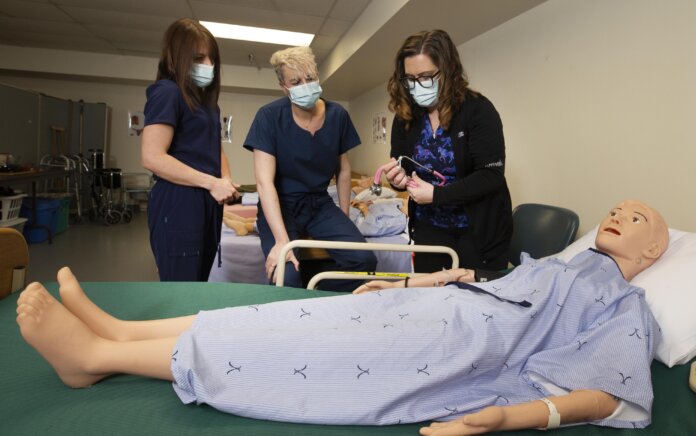HALIFAX: Staff shortages are a recurring issue in the long-term care sector. Continuing care students Amy Lake and Bryce MacDow are part of the solution.
They are two of 18 CBBC Career College students currently working in a long-term care facility under the Province’s new tuition support and work-and-learn programs for continuing care assistants.
“This program has changed my life,” says Lake. “It is an amazing opportunity to be able to learn and work in a supportive, caring facility. This opportunity has given me the ability to further my education without financial concern and stress on my family.”
Lake and MacDow work two days a week providing care to residents at Dykeland Lodge in Windsor and attend classes the other three days.
“Learning in the classroom and on the job has been amazing,” says MacDow. “It has given me the confidence I need to perform my duties for residents who I know and together we share a bond. Helping residents and giving them the best possible care makes me happy and confident in my abilities.”

More help for the long-term care sector is on the way. By early March, almost 80 people will be working in long-term care facilities under the tuition support and work-and-learn programs for continuing care assistants, helping to reduce some of the staffing pressures in the sector.
The programs are part of the Province’s $57 million investment in the continuing care sector announced in December. It includes $22 million to cover tuition costs for more than 2,000 full- or part-time students. Under the work-and-learn program, students are paid and learn in a hands-on way.
“We are taking action to make a career in continuing care more attractive and accessible to ensure Nova Scotians have the care they need as they age,” says Seniors and Long-Term Care Minister Barbara Adams. “There are now several ways people can train to become a continuing care assistant so students can choose the option that works best for them.
“These programs remove barriers and give more people the chance to enter the workforce.”
A clearer picture of the workforce will be available soon through the mandatory Continuing Care Assistants Registry, which opened today, February 2. All continuing care assistants working in the field are required to register to give the government and sector a better understanding of the workforce to help plan recruitment and retention efforts.
It is also open to those who have training but are not actively employed in the field.
The Continuing Care Assistants Registry Act was proclaimed and came into effect today, Feb. 2.
Quotes:
“This program is attracting people who want a meaningful career to enter the workforce sooner because of their on-the-job experience. We’ll hire most of the students with other nursing homes happily offering them employment. There is huge need for continuing care assistants in our sector. The students will help to ease the workload of our dedicated staff now. This important initiative demonstrates to our staff that we are committed to providing quality care by ensuring staff have the help they need so they can take some much-needed time off.”
– Krista Beeler, CEO, Dykeland Lodge, Windsor
“Since the Province announced this exciting training initiative, hundreds of students have expressed interest in becoming a continuing care assistant. This will ensure hundreds of new graduates will enter the employment market in the next 12 months. Nursing homes, hospitals, and home care organizations have all expressed overwhelming interest in hiring continuing care assistants. I would encourage anyone thinking about this career to connect with the college and take advantage of this exciting opportunity.”
– Henry Devlin, President and CEO, CBBC Career College
“We’re pleased about this announcement. The registry will help us understand how many continuing care assistants there are in the province and where in the province recruitment efforts are most needed. Continuing care assistants are the backbone of long-term care and a registry will help to recognize this as the important profession it is inside the health system.”
– Dana Power, Regional Director Operations, Enhanced Care Nova Scotia, Shannex Inc.
Quick Facts:
— students in the work and learn program enter the workforce after a 28-day foundation module, and graduate in 30 weeks
— currently, there are 18 students in the working portion of the program and 61 doing the 28-day foundation module
— the mandatory Continuing Care Assistant Registry is a recommendation of the Long-Term Care Expert Panel and in the Seniors and Long-Term Care Minister’s mandate letter
— Health Association Nova Scotia is administering the mandatory Continuing Care Assistant Registry, which replaces the voluntary registry
— people working as continuing care assistants need to register by June 30 and renew their registration each year
Additional Resources:
Mandatory Continuing Care Assistant Registry: https://www.novascotiacca.ca/cca-registry-information/
News release – Investments to Attract, Retain Continuing Care Workers, Add More Beds: https://novascotia.ca/news/release/?id=20211208001
The overview document, A Healthy Nova Scotia: Solutions for Continuing Care: https://beta.novascotia.ca/documents/improving-continuing-care-investments-support-workers-and-expand-care-seniors





















